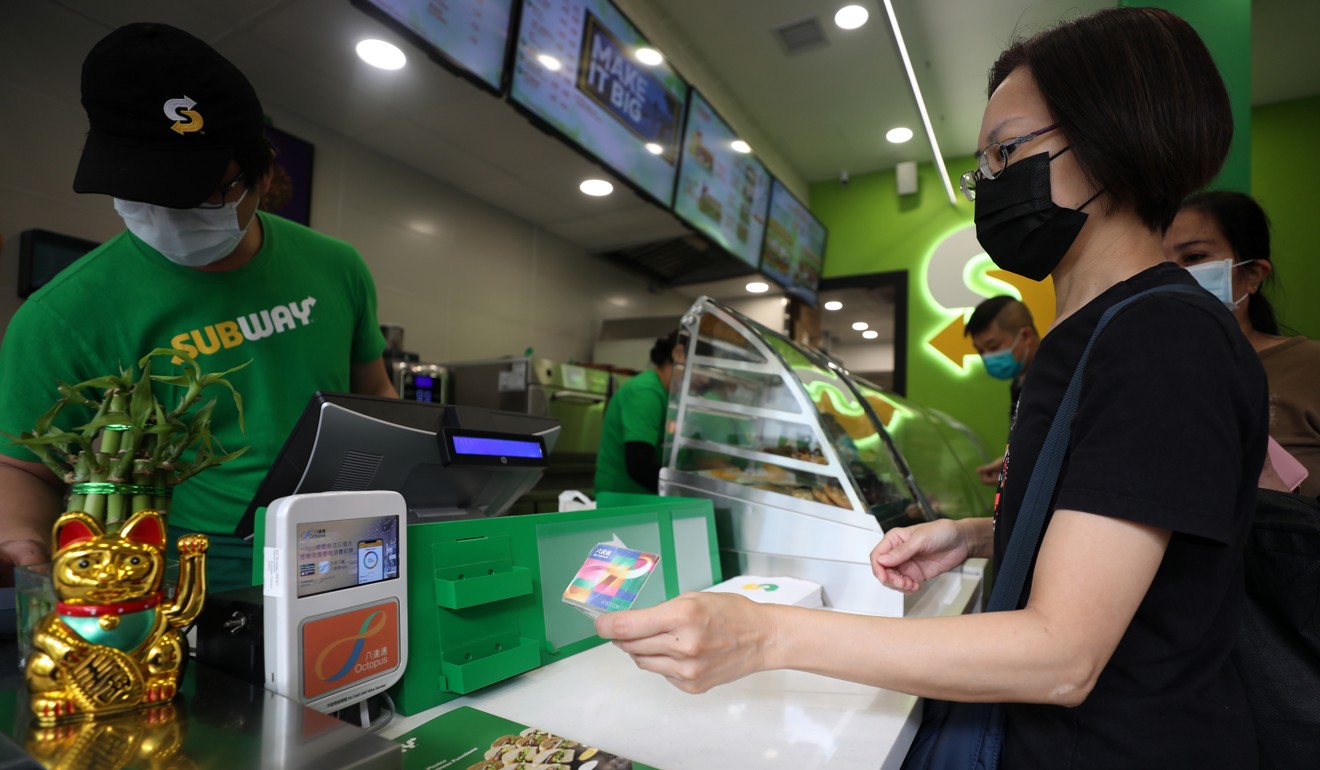
Coronavirus roller coaster: Octopus card usage drops for fast food, transport, but booms at Hong Kong’s grocery stores
- The city’s largest e-payment provider said public transport transactions were down 40 per cent in February as Hongkongers stayed home
- Panic buying saw usage at supermarkets surge, however, while small merchants joined the network amid a new-found distaste for handling cash
Spending on transport and fast food among Hong Kong’s Octopus card users has dropped sharply during the coronavirus epidemic, but panic buying of rice, toilet rolls and surgical masks has cushioned the shortfall, the city’s top e-payment provider told the Post.
Octopus Cards, which issues the namesake plastic card and has an 80 per cent share of the city’s stored-value facility market, recorded a drop of more than 40 per cent year-on-year in public transport transactions in February as hundreds of thousands of workers and students stayed home and social gatherings were avoided, sales and marketing director Rita Li said.
But while usage has been down, more retailers are simultaneously choosing to adopt the card as consumers become reluctant to handle cash amid infection fears.

Li said the number of smaller shops joining the Octopus system, many of which had not previously considered using e-payments, had jumped as much as threefold since the epidemic began.
“There are more merchants who operate a single shop or eatery turning to our e-payment system, some stand-alone stores in the countryside are in talks to join as well,” she said in an interview on Friday.
“Shoppers’ spending patterns have changed a lot as well during the epidemic. Shoppers and merchants do not want to touch bank notes.”
Notorious for being a cash-based market, Hong Kong has long lagged behind mainland China in the use of e-wallets.
As of last December, there were 18 service providers for stored-value facilities, with the latest statistics showing the number of transactions 0.5 per cent lower in the third quarter of last year than the preceding quarter and the transaction value up 2.4 per cent. During that period, the city’s retail and restaurant sales were battered by prolonged anti-government protests.
With 35 million cards in circulation, Octopus is by far Hong Kong’s biggest service provider.
Li said the public health crisis prompted a 40 per cent year-on-year jump in Octopus transactions at supermarkets for February and a 30 per cent rise for the first two months of 2020 from the year-ago period.
She said personal health care stores were equally popular over the period, with nearly 40 per cent growth in transactions for February and over 20 per cent in the first two months.
Overall Octopus card usage, meanwhile, was up for the period, Li said, while declining to provide specific figures.
As fear surrounding the virus that causes Covid-19 grew in late January, panic-stricken shoppers hoarded toilet paper, rice and sanitising products at supermarkets while desperately snapping up surgical masks at pharmacies or personal health care stores.
MTR Corp’s passenger numbers plummet amid outbreak
Octopus transactions at fast food outlets, however, reflected an industry-wide downturn, with usage down more than 10 per cent in February as well as the combined January-February period, compared with last year.
“Takeaway was more popular during the periods, which could have cushioned the decline,” Li said.
The epidemic also took a heavy toll on the transport sector, with transactions for railways, franchised buses and mini buses down 30-40 per cent in January and February, and more than 40 per cent for February alone.
Li conceded that a tourism slump, which dropped from an average of 200,000 visitors a day in the first half of last year to 3,000 visitors daily after tough new quarantine measures were installed at the border, meant fewer new Octopus cards were issued.
To ease the burden on small and medium-sized merchants, she said Octopus exempted a 1.5 per cent transaction fee they were required to pay when transferring money from the company’s O! epay stored value services to banks in the first half of this year.
“During the first week of March, spending showed signs of improvement along with more people and civil servants returning to the office,” Li said. “We are cautiously optimistic about the economy, but may see some stores go bust, and higher unemployment.”
Lawmaker for innovation and technology Charles Mok said moving to online commerce and e-payment was long overdue in Hong Kong.
“Because of the mainland Chinese policy of allowing tourists from across the border to flood the city, local businesses have become too complacent and missed the boat on the transformation,” he said.
“Do not make excuses any more and do not say we have no money left to invest in the transformation.”

